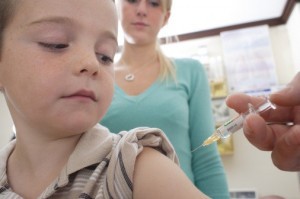 The U.S. Institute of Medicine (IOM) has stated in a recent report that vaccines are overwhelmingly safe and that they do not cause diabetes or autism. The IOM came to the conclusion after reviewing over 1,000 published studies.
The U.S. Institute of Medicine (IOM) has stated in a recent report that vaccines are overwhelmingly safe and that they do not cause diabetes or autism. The IOM came to the conclusion after reviewing over 1,000 published studies.
“We looked very hard and found very little evidence of serious adverse harms from vaccines,” said Ellen Wright Clayton, chairwoman of the reporting committee. “The message I would want parents to have is one of reassurance.” Wright Clayton is also the director of the Center for Biomedical Ethics and Society at Vanderbilt University in Nashville, Tennessee.
The US Health Resources and Services Administration commissioned the report in 2009. It looked at the eight vaccines that make up the majority of the claims filed with the National Vaccine Injury Compensation Program (VICP). The VICP covers 11 vaccines, providing compensation for patients whose health is negatively impacted by vaccines.
The vaccines reviewed by the study include those for influenza, hepatitis B, hepatitis A, meningococcal disease, human papillomavirus, chicken pox, diphtheria, tetanus and pertussis (DTaP), mumps and rubella (MMR), and measles.
The report does state that the research “convincingly supports a causal relationship” for 14 actual adverse health effects. These effects include allergic reactions to six of the vaccines, infections associated with the chicken pox vaccine, and brain inflammation and fever-induced seizures linked to the MMR vaccine. It stated that the severe effects only occur in children who already have weak immune systems.
Four additional adverse effects were linked to vaccines but the evidence for a causal relationship was less convincing. Of the 135 remaining links between vaccines and adverse health effects, the study stated that there was “inadequate evidence to accept or reject a causal relationship.” The VICP may use the new analysis to update the Vaccine Injury Table. The table already includes the majority of the adverse effects contained in the new IOM report.
The IOM states that evidence “favors rejection” of reports that Type 1 diabetes was linked to the MMR and DTaP vaccines. The IOM also sought to reject reports that the MMR vaccine was linked to autism.
“We found five really solid epidemiological reports that were very clear that MMR is not associated with autism, and does not cause autism,” said Wright Clayton.
The IOM has issued previous reports that reached the same conclusion. A 1998 paper was published in The Lancet by U.K.-based surgeon Andrew Wakefield positing that links existed between autism and vaccines. That report has since been retracted by The Lancet, which stated that “several elements” of Wakefield’s paper were “incorrect.” However, the paper continues to have an influence: some parents still refuse to have their children vaccinated, citing risks of autism. The lack of vaccination has led to outbreaks of diseases among children, including whooping cough and measles.
“For those parents who are on the fence, this will be another piece of reassuring evidence, although I don’t know how many more pieces of reassuring evidence you need. For those who are committed to the concept that vaccines are harmful independent of what the data say, it won’t matter,” said Paul Offit, chief of the infectious diseases division of The Children’s Hospital of Philadelphia.
Offit does say that he is “uncomfortable as a scientist” with the methodology utilized by the IOM. When the committee analyzes most of the vaccines, “They’re looking at case reports and trying to decide whether they think the evidence supports a link,” he says. “That’s an unusual way to do science, because now you’re making it more subjective.”